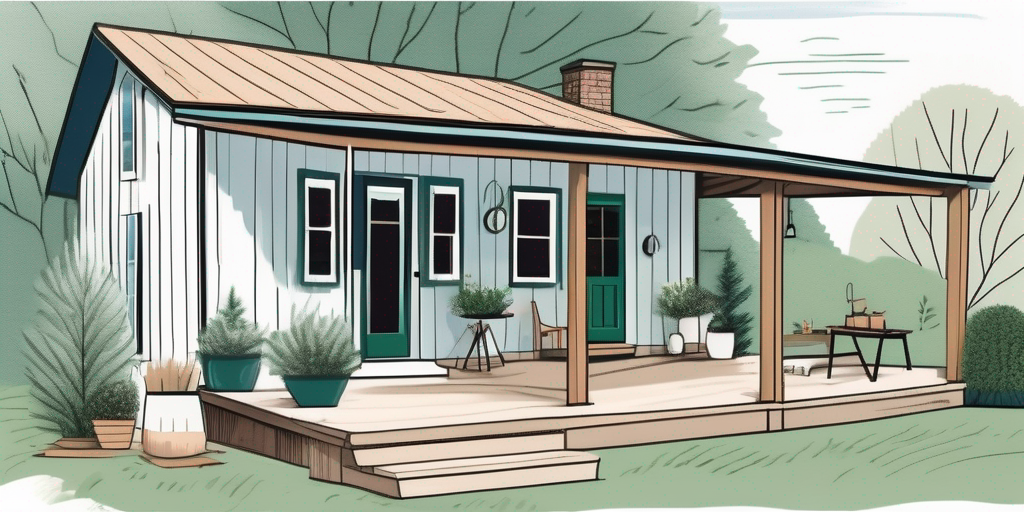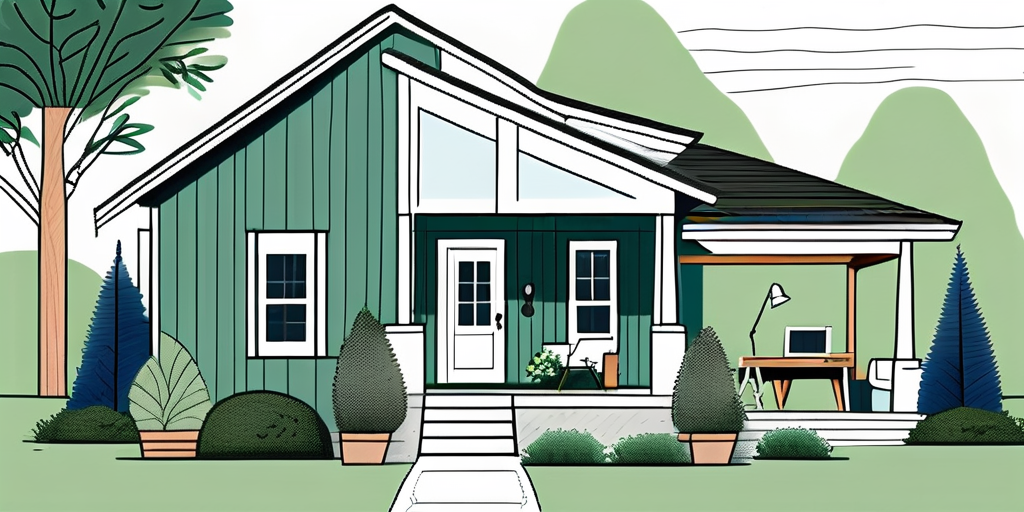
Welcome to your go-to guide for discovering the charm and practicality of homes equipped with workshops in the beautiful state of Tennessee. Whether you're a hobbyist, a professional, or simply someone who enjoys the satisfaction of DIY projects, a dedicated workshop can be a game-changer. In this article, we'll navigate the various aspects of these homes, from the appeal of having a workshop to practical considerations for buying and maintaining your space.
Homes with workshops hold a special allure for those who appreciate the freedom to create within their own space. Imagine a dedicated area where you can experiment with different materials, tools, and artistic expressions without worrying about cleanup or interruptions. This personal sanctuary fosters not just creativity but also a sense of ownership over one’s projects, allowing for a deeper connection to the work being produced.

For many, having a workshop isn’t just about convenience; it’s about unleashing creativity. This personal oasis allows for concentration on projects ranging from woodworking to crafting, providing a place for imagination to thrive. The appeal goes beyond productivity, enriching the lifestyle of homeowners who value craftsmanship. Additionally, workshops can serve as a retreat from the hustle and bustle of daily life, offering a quiet space to reflect and recharge while engaging in fulfilling activities.
Having a workshop at home can be incredibly beneficial in numerous ways. Firstly, it provides an environment tailored to your needs, allowing for easy access to tools and materials. Say goodbye to the hassle of shuffling things around the garage or attic! With everything organized and within reach, you can dive into projects with minimal setup time, making it easier to pursue your passions on a whim.
Moreover, a home workshop can project your passion into tangible products, whether handcrafted furniture, beautifully painted art, or custom metalwork. This not only increases personal satisfaction but can also lead to entrepreneurial opportunities. After all, why not turn your hobbies into a side hustle? Many artisans have successfully transformed their workshops into thriving businesses, selling their creations online or at local craft fairs, thus blending their love for crafting with financial gain.
When considering a home workshop, there are a few key factors to keep in mind. First, assess the size of the space. You'll want enough room to comfortably move around and store all of your tools and materials. A well-planned layout can enhance workflow, allowing you to transition smoothly from one task to another without feeling cramped or disorganized.
Ventilation and lighting are also critical components. Good airflow will help mitigate fumes from paints and solvents, and adequate lighting will ensure you can see your work clearly, which is particularly important for intricate tasks. Natural light is a bonus, as it not only brightens the space but can also boost your mood and creativity. Lastly, consider the electrical capacity of your workshop. If you plan on using power tools, ensure there's a sufficient number of outlets and that your electrical system can handle the load. Additionally, incorporating storage solutions such as shelving, pegboards, and cabinets can help maintain an organized and efficient workspace, allowing you to focus on what you love most: creating.
Now that we've covered the allure and basics of having a workshop at home, let’s dive into the different types of workshops you might consider. Each type caters to specific hobbies and skills, providing tailored environments that enhance creativity and productivity.

Woodworking workshops are a favorite among enthusiasts who love working with timber, whether it’s crafting furniture or creating intricate wood sculptures. These workshops often include specialized tools like saws, chisels, and routers, all essential for achieving precise cuts and designs.
Setting up a woodworking workshop also means having a dust collection system to keep the space clean and free from debris, which can be crucial for both safety and efficiency. Make sure to allocate ample storage for your wood stock and finished products, as well as workbenches for assembly and finishing touches. Additionally, consider incorporating a variety of lighting options, such as task lighting for detailed work and ambient lighting to create a comfortable atmosphere. The right lighting can significantly impact your ability to see the finer details and enhance your overall woodworking experience.
If your passions lie in metal, a metalworking workshop can be an exciting endeavor. These spaces often feature welding equipment, lathes, and milling machines for crafting everything from sculptures to custom fabrications.
When outfitting a metalworking workshop, ensure you have a robust ventilation system due to the fumes and particles produced during work. Additionally, invest in safety gear—welding helmets, gloves, and proper clothing are non-negotiable when dealing with hot materials and sparks. Beyond safety, consider the layout of your workshop; having a designated area for each type of work can streamline your processes. For instance, a separate zone for cutting, welding, and finishing can help maintain organization and efficiency, allowing you to focus on your projects without unnecessary interruptions.
Artistic workshops encompass a broad range of creative pursuits, from painting and ceramics to crafts like quilting or jewelry making. These spaces are designed to inspire and allow for experimentation with various mediums.
In an artistic workshop, you’ll focus on storage solutions for varied supplies, like paintbrushes, canvases, and clay. Think about having ample wall space for corkboards or pegboards where you can hang tools and projects in progress. Ultimately, it’s all about curating a space that lets your creativity flow without boundaries. To further enhance the creative atmosphere, consider adding personal touches such as mood boards or inspirational quotes that resonate with your artistic journey. Incorporating comfortable seating and a small refreshment area can also encourage longer, more productive sessions, making your workshop a true sanctuary for creativity and expression.
If you’ve been convinced of the benefits and wonders of having a home workshop, the next step is understanding how to buy a place that includes one. The process may seem daunting, but breaking it down can make it manageable and enjoyable.
When looking for a home with a workshop, begin by evaluating the area. Is it spacious enough for your needs? Is the layout conducive to your particular type of work? Be sure to visualize your projects in the space and assess whether it can accommodate all the tools and equipment you'll need.
Additionally, consider the current state of the workshop. Does it require significant renovations or upgrades? Understanding these factors will help you set an appropriate budget and timeline for your new creative haven. Look for features such as adequate lighting, ventilation, and electrical outlets, which can greatly enhance your productivity and comfort while working on projects. A well-placed window can provide natural light, making the space not only functional but also inviting.
The location of your future home is just as important as the workshop itself. Think about proximity to friends and community—after all, collaborating with fellow creators can enhance your passion. Also, consider local amenities and resources like hardware stores, woodworking supply shops, or art supply boutiques that are essential for your projects.
Furthermore, think about zoning regulations and whether the area allows for home businesses if you are considering selling your creations. It’s crucial to ensure your new workshop complies with local laws. Additionally, consider the neighborhood's overall vibe; a community that values creativity and craftsmanship can be inspiring, offering opportunities for local workshops, craft fairs, and networking events that can help you grow your skills and business.
Securing financing for a home with a workshop may require a different approach than your average home loan. Be prepared to discuss the added value a workshop can bring and how it fits into your home-buying budget.
Explore specific types of loans or special programs for buyers with unique needs. Getting pre-approved can also give you a better understanding of your budget while searching for that perfect workspace. Additionally, consider the potential for increased property value that a well-equipped workshop can provide. This could be a significant selling point in the future, especially in a market where home-based businesses are becoming more common. Be sure to keep records of your renovations and improvements, as they can contribute to the overall appraisal of your property when the time comes to sell.
Once you've settled into your home with a workshop, it’s vital to think about maintaining and upgrading the space to maximize its potential. Regular upkeep will keep it functional and enjoyable.

Routine maintenance is essential to ensure safety and longevity in your workshop. Regularly check tools and equipment for wear and tear. Investing time into sharpening blades, replacing dull bits, and maintaining the cleanliness of your space goes a long way.
Consider establishing a seasonal cleaning ritual—this can help you stay organized and allows you to start each new creative season with a fresh slate. Additionally, keeping a maintenance log can be beneficial; noting when tools were last serviced or replaced can help you stay ahead of any potential issues, ensuring that your workshop remains a safe and productive environment.
As you settle into your workshop, you might find areas for improvement. Consider upgrading lighting with LED fixtures that mimic daylight to reduce eye strain. If space allows, adding a dedicated area for organizing tools can enhance efficiency. Wall-mounted pegboards or magnetic strips can keep tools visible and within easy reach, which not only saves time but also fosters a more creative atmosphere.
Investing in mobile work surfaces can also be beneficial, allowing you to reconfigure your workspace as needed. And don’t forget about entertainment options—having a radio or speaker system can make your creative sessions much more enjoyable! Furthermore, incorporating a small refreshment station with a coffee maker or water cooler can keep your energy levels up during long projects, making your workshop not just a place of work, but a hub of inspiration and creativity. Consider adding plants or artwork to personalize the space, creating an inviting environment that reflects your unique style and passion for your craft.
As with any home project, it’s essential to be aware of legal and safety considerations when setting up a workshop in Tennessee. This not only keeps you compliant but also ensures a safe working environment.
Before launching into your workshop endeavors, familiarize yourself with local zoning laws. These regulations dictate how you can use your property, including any home-based business activities.
It’s recommended to reach out to your local zoning board to understand what’s permitted. This proactive approach can save you from potential legal issues down the line. Additionally, some areas may have restrictions on noise levels, operating hours, or even the type of materials you can use, particularly if you live in a residential neighborhood. Being informed about these details can help you avoid conflicts with neighbors and ensure that your workshop operates smoothly.
Maintaining safety in your workshop is non-negotiable. Ensure all tools are stored correctly and inaccessible to children or pets. Regularly check fire extinguishers and first-aid kits to ensure they're well-stocked and functioning. Safety gear is also essential—always use goggles, gloves, and masks when working with hazardous materials.
Furthermore, consider implementing a safety training program for anyone who may work in the space, including family members or friends who might join you in your creative pursuits. This could involve basic tool usage training, emergency procedures, and even first aid basics. Creating a culture of safety not only protects everyone involved but also fosters a more productive and enjoyable workshop environment. Remember, a well-organized and safe workshop can enhance your creativity and efficiency, allowing you to focus on your projects without unnecessary distractions.
By creating a safe and compliant workshop environment, you can focus on what truly matters: unleashing your creativity and making art!
In conclusion, homes with workshops in Tennessee offer an incredible opportunity for creativity and personal expression. By understanding the appeal, types of workshops, buying process, and safety considerations, you're well on your way to finding—and enjoying—the perfect workshop space! Happy crafting!